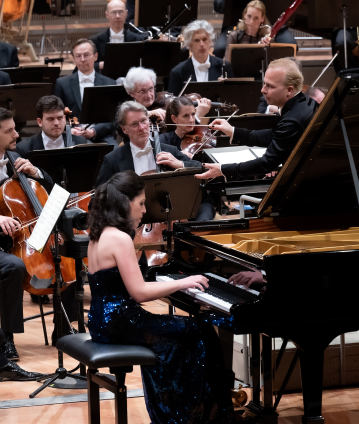Yannick Nézet-Séguin and Beatrice Rana

A statement against terror, violence and war: Shostakovich’s Seventh Symphony, composed during the siege of Leningrad by German troops, established the composer’s international reputation. The programme, conducted by Yannick Nézet-Séguin, opens with the melodious Piano Concerto by the young Clara Schumann. The Italian pianist Beatrice Rana made her debut as soloist.
Clara Wieck was a star at the age of 14 – and living proof of her father’s skill as a piano teacher. It was part of the virtuoso tradition of the 19th century to present one’s own works to the public, and so the young Clara responded to the invitation to compose a concerto. She skilfully showcased both her technical brilliance and her emotional power. The second movement dispenses with the orchestra: the piano alone engages the cello in a lyrical conversation. For the orchestration of the virtuoso outer movements, she asked for help from another pupil of her father’s who lived in their house like a member of the family: Robert Schumann.
Like Clara Wieck – later Clara Schumann – the Italian pianist Beatrice Rana first appeared in public at the age of nine. Her career has taken her around the world, and she now appears with the Berliner Philharmoniker, conducted by the music director of the Metropolitan Opera in New York, Yannick Nézet-Séguin, who – as a regular guest – is well known not only to Berlin audiences but also to the soloist: they have recorded the Piano Concerto together on CD.
Freedom of movement and the ability to act freely is something that many people only appreciate when they are confronted with restrictions. Dmitri Shostakovich experienced the loss of these freedoms in many different ways. He was constrained musically by the Soviet regime and also experienced the terrible siege of Leningrad from 1941 onwards. Shostakovich composed and then announced his new symphony on the radio. His Seventh became a legend even before it was completed – propagated by the state media as show of resilience and defiance.
The work begins with a variation movement on a striking theme that can be interpreted in many ways: does Shostakovich pervert The Song of the Germans here, or is he parodying Hitler’s favourite operetta, Franz Lehár’s Merry Widow? There is at least evidence of a self-quotation from Shostakovich’s opera Lady Macbeth of Mtsensk – as a symbol of the tyranny he experienced. However, the “Leningrad” Symphony also beautifully expresses the desire for humanity. It is a monument against violence – once again of tragic relevance today.
© 2024 Berlin Phil Media GmbH
Related interviews
Artists
Our recommendations
- Yannick Nézet-Séguin conducts works by Tchaikovsky and Ravel
- Yannick Nézet-Séguin and Lisa Batiashvili
- Yannick Nézet-Séguin conducts Debussy and Prokofiev
- Yannick Nézet-Séguin conducts Mahler and Reinicke
- Yannick Nézet-Séguin makes his debut with Berlioz and Prokofiev
- Yannick Nézet-Séguin conducts Brahms’s “Ein deutsches Requiem”